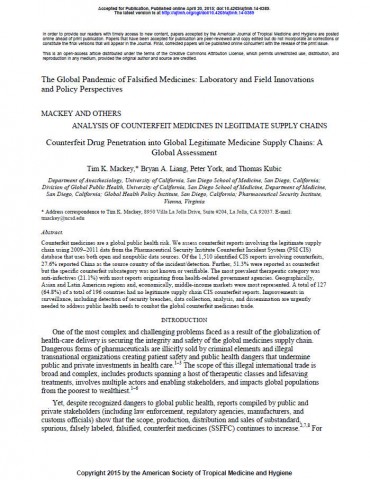
- Independent report developed by researchers at the University College London School of Pharmacy and the international research agency Matrix Insight
A study released today highlights opportunities for a better coordinated international response to the threat of falsified, or counterfeit, medicines. The prevention of pharmaceutical falsification should be seen as an integral part of the global health community’s effort to improve access to effective, good quality medicines and protect public health worldwide. Falsified Medicines and the Global Public’s Health was commissioned by the IFPMA and was independently prepar ed by researchers at the University College London (UCL) School of Pharmacy and the international research agency Matrix Insight.
ed by researchers at the University College London (UCL) School of Pharmacy and the international research agency Matrix Insight.
The new report focuses on the need for high quality information about the scale of harm caused by medicine falsification. Past studies found that 15 to 50 percent of anti-malarial treatments purchased in parts of Asia and Africa to be counterfeit, and data overall suggest that falsified products may account for nearly one percent of global medicine sales. While people in less developed communities are at greater risk than in richer ones, falsified therapies are regularly reported in virtually every country from the US and EU to the poorest sub-Saharan nations. They also affect every major therapeutic category.
“There is already considerable convergence in the anti-falsification measures being adopted at national and regional levels to safeguard patients’ and the public’s health,” said David Taylor, Professor of Pharmaceutical and Public Health Policy at the UCL School of Pharmacy. “Recent research suggests that progress has been achieved, but additional surveillance-backed, systematically-supported and globally-coordinated efforts could do more to protect against falsification and improve health.”
The new report’s key conclusions include:
- An increasing number of governments (including China, India, Brazil, Russia and Nigeria) has, through their actions, recognized the need for effective measures against medicines falsification, which involves deliberately misrepresenting products’ origins and circumventing regulatory controls designed to assure treatment safety and effectiveness.
- The World Health Organization is uniquely placed to add value to governments’ efforts to protect against all forms of pharmaceutical crime, along with those of local regulators and other national and international agencies. More investment is needed to not only quantify medicines falsification but to provide early warning of potentially hazardous products as soon as they are detected in legitimate supply chains.
- All relevant stakeholders should be able and willing to participate in appropriate preventive activities at all levels. The new UCL/Matrix analysis emphasizes the need for more collaborative action between all stakeholders involved in better medicines use. At worst, unresolved disputes between vested interests may cost lives which responsible global action could have saved.
“This is a crime against patients and poses a public health risk that can lead to treatment failure, antibiotic resistance, extended illness, disability and even death.” said Eduardo Pisani, IFPMA Director General. “Reducing this threat requires heightened public awareness everywhere and coordinated actions – by key stakeholders such as governments, NGOs, international organizations, pharmacists, patients, and industry – to protect the integrity of medicines and the well-being of those who take them.”
In 2010 the International Federation of Pharmaceutical Manufacturers and Associations (IFPMA) developed Ten Principles on Counterfeit Medicines to help raise awareness and understanding of this global health issue. This document and the full UCL/Matrix report are available at: Ten Principles and UCL/Matrix Report .













